人教版八年级下册Unit 1 Section A 2d知识点课件 (共24张PPT,内嵌音频)
文档属性
| 名称 | 人教版八年级下册Unit 1 Section A 2d知识点课件 (共24张PPT,内嵌音频) | 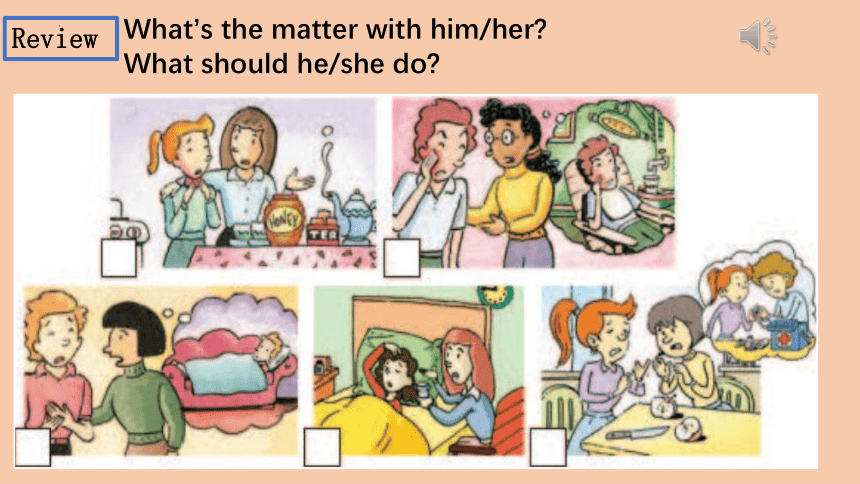 | |
| 格式 | pptx | ||
| 文件大小 | 10.2MB | ||
| 资源类型 | 教案 | ||
| 版本资源 | 人教新目标(Go for it)版 | ||
| 科目 | 英语 | ||
| 更新时间 | 2023-06-14 19:16:51 | ||
图片预览

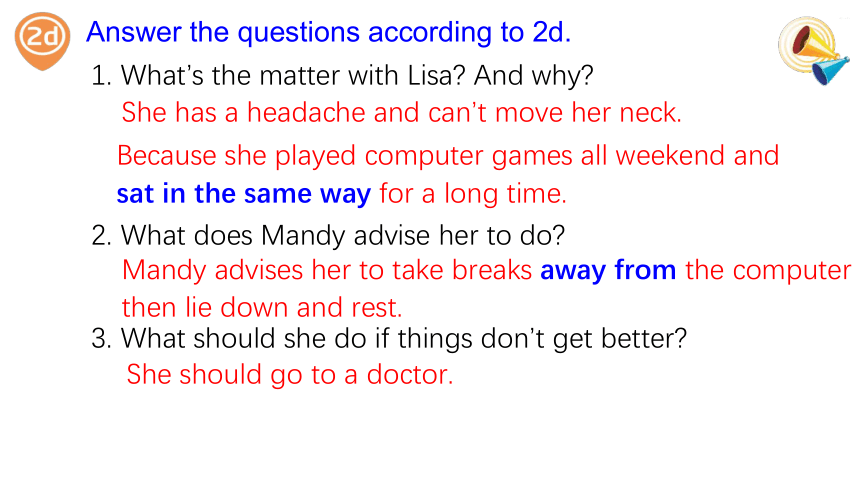
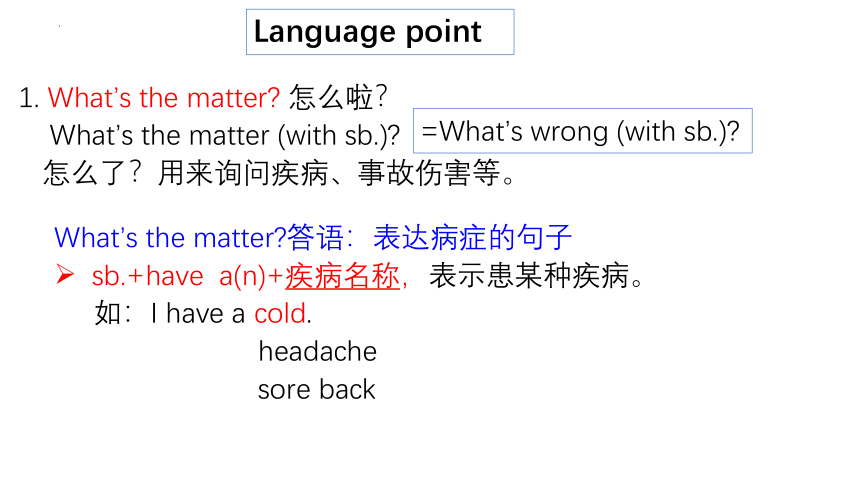
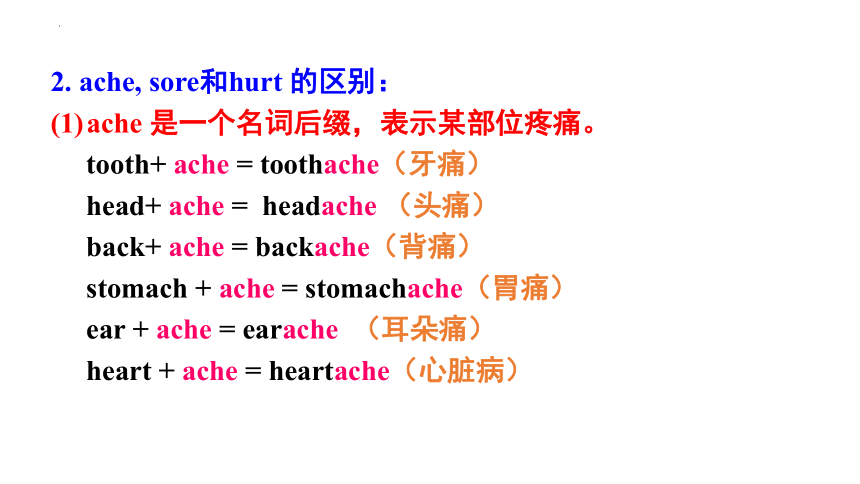
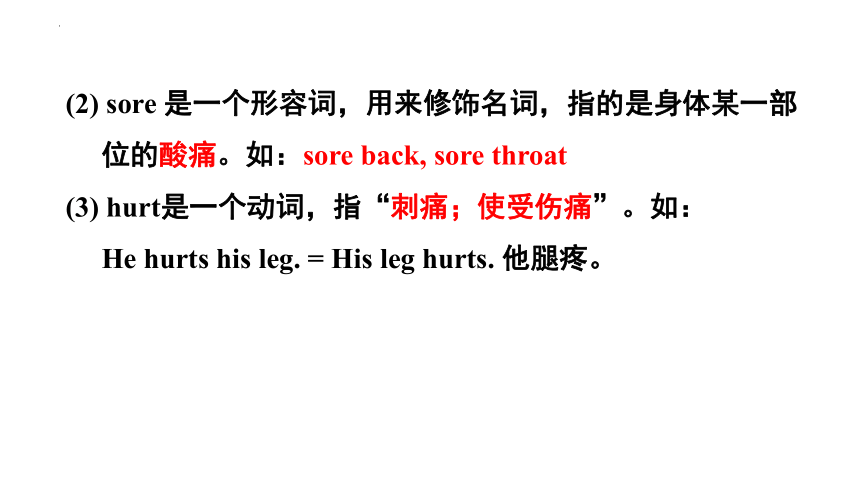
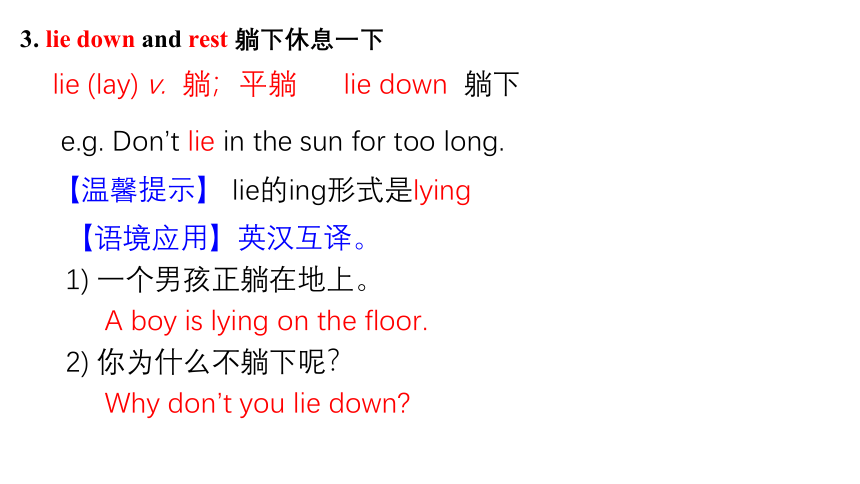
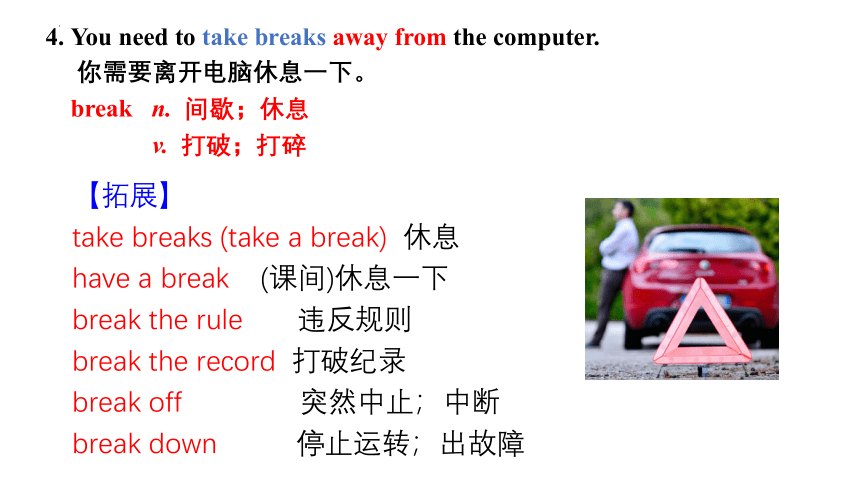
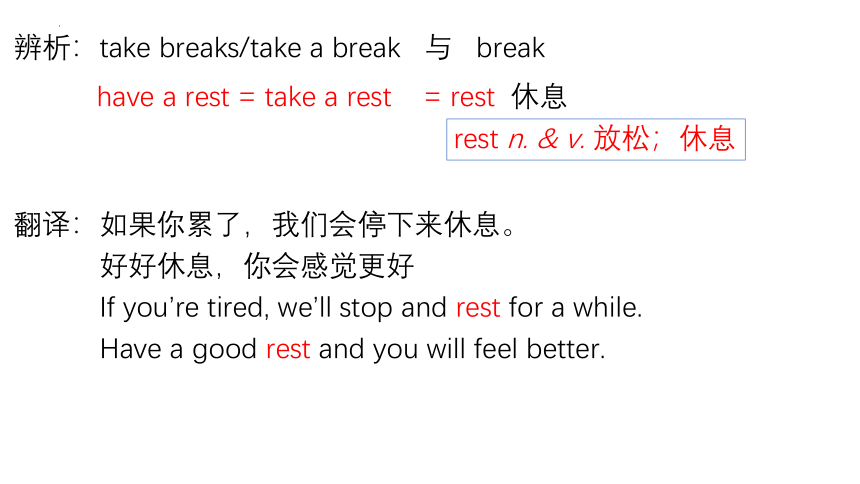
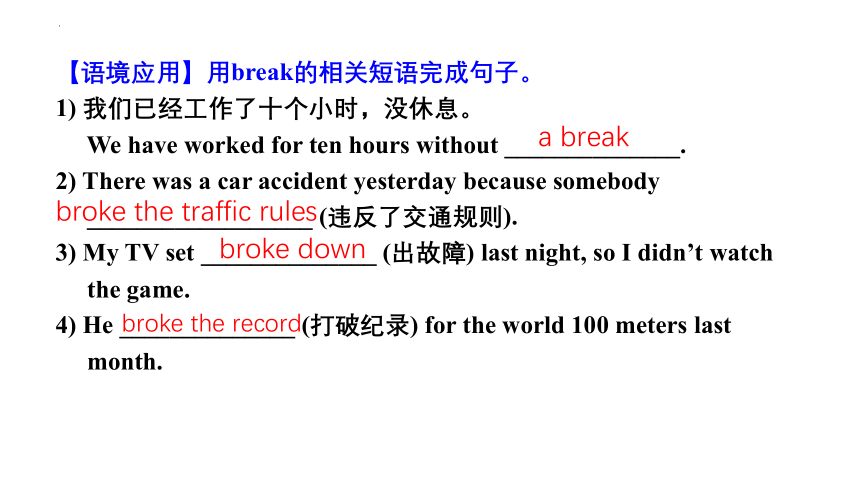
文档简介
(共24张PPT)
Review
What’s the matter with him/her
What should he/she do
1. What’s the matter with Lisa And why
She has a headache and can’t move her neck.
Because she played computer games all weekend and sat in the same way for a long time.
Answer the questions according to 2d.
2. What does Mandy advise her to do
3. What should she do if things don’t get better
Mandy advises her to take breaks away from the computer
then lie down and rest.
She should go to a doctor.
1. What’s the matter 怎么啦?
What’s the matter (with sb.)
怎么了?用来询问疾病、事故伤害等。
What’s the matter 答语:表达病症的句子
sb.+have a(n)+疾病名称,表示患某种疾病。
如:I have a cold.
headache
sore back
=What’s wrong (with sb.)
Language point
2. ache, sore和hurt 的区别:
ache 是一个名词后缀,表示某部位疼痛。
tooth+ ache = toothache(牙痛)
head+ ache = headache (头痛)
back+ ache = backache(背痛)
stomach + ache = stomachache(胃痛)
ear + ache = earache (耳朵痛)
heart + ache = heartache(心脏病)
(2) sore 是一个形容词,用来修饰名词,指的是身体某一部
位的酸痛。如:sore back, sore throat
(3) hurt是一个动词,指“刺痛;使受伤痛”。如:
He hurts his leg. = His leg hurts. 他腿疼。
3. lie down and rest 躺下休息一下
lie (lay) v. 躺;平躺 lie down 躺下
e.g. Don’t lie in the sun for too long.
【温馨提示】 lie的ing形式是lying
【语境应用】英汉互译。
1) 一个男孩正躺在地上。
A boy is lying on the floor.
2) 你为什么不躺下呢?
Why don’t you lie down
4. You need to take breaks away from the computer.
你需要离开电脑休息一下。
break n. 间歇;休息
v. 打破;打碎
【拓展】
take breaks (take a break) 休息
have a break (课间)休息一下
break the rule 违反规则
break the record 打破纪录
break off 突然中止;中断
break down 停止运转;出故障
have a rest = take a rest = rest 休息
辨析:take breaks/take a break 与 break
rest n. & v. 放松;休息
翻译:如果你累了,我们会停下来休息。
好好休息,你会感觉更好
If you’re tired, we’ll stop and rest for a while.
Have a good rest and you will feel better.
【语境应用】用break的相关短语完成句子。
1) 我们已经工作了十个小时,没休息。
We have worked for ten hours without ______________.
2) There was a car accident yesterday because somebody __________________ (违反了交通规则).
3) My TV set ______________ (出故障) last night, so I didn’t watch the game.
4) He ______________ (打破纪录) for the world 100 meters last month.
a break
broke the traffic rules
broke down
broke the record
away from 离开……;与……有一定的距离
(与不同动词搭配,意思会受上下文影响)
e.g. In spring or autumn, my parents usually take their
annual (每年的) vacation away from home.
我父母通常在春季或秋季离家去外地休他们的年假。
【语境应用】翻译句子。
1) I’ll be away from school for a week.
_______________________________
2) They live away from us.
_______________________________
我将离校一周。
他们不和我们住在一起。
5. If your head and neck still hurt tomorrow, then go to a doctor.
如果明天你的头和脖子仍然疼的话,那就去看看大夫吧。
hurt vi. 感到疼痛,身体部位的疼痛。要用疼痛的具体部位作主语。
hurt vt. (使)疼痛;受伤;伤害。肉体上的伤害,和精神情感上的害。
hurt oneself 伤着了某人自己
hurt adj. 受伤的,可作定语和表语
e.g. Fortunately, no one was seriously hurt.
Grammar Focus
A: What’s the matter
B: I have a stomachache.
A: You shouldn’t eat so much next time.
A: What’s the matter with Ben
B: He hurts himself. He has a sore back.
A: He should lie down and rest.
A: Do you have a fever
B: Yes, I do./ No, I don’t./ I don’t know.
A: Does he have a toothache
B: Yes, he does.
A: He should see a dentist and get an X-ray.
A: What should she do
B: She should take her temperature.
A: Should I put some medicine on it
B: Yes, you should./ No, you shouldn’t.
情态动词should
should属于情态动词,意为“应该;应当”,不能单独作谓语,后接动词原形,没有人称和数的变化。should的否定形式为should not,缩写形式为shouldn’t。在疑问句中should位于主语前面,即:变一般疑问句,should提前。
We should go home at once. 我们应该马上回家。
You shouldn’t smoke here. 你不应该在这里抽烟。
Grammar
should用法小结
1. 用来向别人提出建议或劝告别人做某事,意为“应
该;应当”。
e.g. —Tom, I have a toothache. 汤姆,我牙痛。
—You should see a dentist. 你应当去看牙医。
2. 表示现在或将来的某种义务或责任。
e.g. We should respect the old.
我们应该尊重老人。
You should leave her a note.
你应该给她留个字条。
3. 用来表示要求、命令。
e.g. You should listen to the teacher carefully in class.
在课堂上你应该认真听老师讲课。
4. 表示可能性、期望以及推测即将发生的情况。
e.g. They should be there by now.
他们现在应该到那儿了。
It should be snowing now according to the
weather forecast.
按天气预报,现在应该下雪才是。
5. Should/Shall I … 用来征求意见、提供帮助或请求指示。
e.g. Should I help you clean the bedroom
要不要我帮你打扫卧室?
Should we begin now
我们要不要现在开始呢?
6. “假如;万一”。表可能。常用于if 引导的条件状语从句
中。
e.g. If you should change your mind, please let me konw.
假如你改变主意的话,请告诉我。
In case you should need any help, here's my number.
万一你需要帮助的话,这是我的电话号码。
myself (我自己) ,yourself (你自己)是反身代词。表示“某人自己的词”叫反身代词。见下表:
我自己 你自己 他自己 她自己 它自己
我们自己 你们自己 他(她、它)们自己
反身代词小结:
myself
yourself
himself
herself
itself
themselves
yourselves
ourselves
Presentation
4a
Fill in the blanks and practice the conversations.
A: I hurt ________ when I played basketball yesterday.
What _______ I do
B: You _______ see a doctor and get an X-ray.
2. A: ________the matter
B: My sister and I ______ sore throats. _______
we go to school
A: No, you ___________.
myself
should
should
What’s
have
Should
shouldn’t
3. A: _______ Mike ______ a fever
B: No, he ________. He ____ a stomachache.
A: He _______ drink some hot tea.
Does
have
doesn’t
has
should
THANKS
Review
What’s the matter with him/her
What should he/she do
1. What’s the matter with Lisa And why
She has a headache and can’t move her neck.
Because she played computer games all weekend and sat in the same way for a long time.
Answer the questions according to 2d.
2. What does Mandy advise her to do
3. What should she do if things don’t get better
Mandy advises her to take breaks away from the computer
then lie down and rest.
She should go to a doctor.
1. What’s the matter 怎么啦?
What’s the matter (with sb.)
怎么了?用来询问疾病、事故伤害等。
What’s the matter 答语:表达病症的句子
sb.+have a(n)+疾病名称,表示患某种疾病。
如:I have a cold.
headache
sore back
=What’s wrong (with sb.)
Language point
2. ache, sore和hurt 的区别:
ache 是一个名词后缀,表示某部位疼痛。
tooth+ ache = toothache(牙痛)
head+ ache = headache (头痛)
back+ ache = backache(背痛)
stomach + ache = stomachache(胃痛)
ear + ache = earache (耳朵痛)
heart + ache = heartache(心脏病)
(2) sore 是一个形容词,用来修饰名词,指的是身体某一部
位的酸痛。如:sore back, sore throat
(3) hurt是一个动词,指“刺痛;使受伤痛”。如:
He hurts his leg. = His leg hurts. 他腿疼。
3. lie down and rest 躺下休息一下
lie (lay) v. 躺;平躺 lie down 躺下
e.g. Don’t lie in the sun for too long.
【温馨提示】 lie的ing形式是lying
【语境应用】英汉互译。
1) 一个男孩正躺在地上。
A boy is lying on the floor.
2) 你为什么不躺下呢?
Why don’t you lie down
4. You need to take breaks away from the computer.
你需要离开电脑休息一下。
break n. 间歇;休息
v. 打破;打碎
【拓展】
take breaks (take a break) 休息
have a break (课间)休息一下
break the rule 违反规则
break the record 打破纪录
break off 突然中止;中断
break down 停止运转;出故障
have a rest = take a rest = rest 休息
辨析:take breaks/take a break 与 break
rest n. & v. 放松;休息
翻译:如果你累了,我们会停下来休息。
好好休息,你会感觉更好
If you’re tired, we’ll stop and rest for a while.
Have a good rest and you will feel better.
【语境应用】用break的相关短语完成句子。
1) 我们已经工作了十个小时,没休息。
We have worked for ten hours without ______________.
2) There was a car accident yesterday because somebody __________________ (违反了交通规则).
3) My TV set ______________ (出故障) last night, so I didn’t watch the game.
4) He ______________ (打破纪录) for the world 100 meters last month.
a break
broke the traffic rules
broke down
broke the record
away from 离开……;与……有一定的距离
(与不同动词搭配,意思会受上下文影响)
e.g. In spring or autumn, my parents usually take their
annual (每年的) vacation away from home.
我父母通常在春季或秋季离家去外地休他们的年假。
【语境应用】翻译句子。
1) I’ll be away from school for a week.
_______________________________
2) They live away from us.
_______________________________
我将离校一周。
他们不和我们住在一起。
5. If your head and neck still hurt tomorrow, then go to a doctor.
如果明天你的头和脖子仍然疼的话,那就去看看大夫吧。
hurt vi. 感到疼痛,身体部位的疼痛。要用疼痛的具体部位作主语。
hurt vt. (使)疼痛;受伤;伤害。肉体上的伤害,和精神情感上的害。
hurt oneself 伤着了某人自己
hurt adj. 受伤的,可作定语和表语
e.g. Fortunately, no one was seriously hurt.
Grammar Focus
A: What’s the matter
B: I have a stomachache.
A: You shouldn’t eat so much next time.
A: What’s the matter with Ben
B: He hurts himself. He has a sore back.
A: He should lie down and rest.
A: Do you have a fever
B: Yes, I do./ No, I don’t./ I don’t know.
A: Does he have a toothache
B: Yes, he does.
A: He should see a dentist and get an X-ray.
A: What should she do
B: She should take her temperature.
A: Should I put some medicine on it
B: Yes, you should./ No, you shouldn’t.
情态动词should
should属于情态动词,意为“应该;应当”,不能单独作谓语,后接动词原形,没有人称和数的变化。should的否定形式为should not,缩写形式为shouldn’t。在疑问句中should位于主语前面,即:变一般疑问句,should提前。
We should go home at once. 我们应该马上回家。
You shouldn’t smoke here. 你不应该在这里抽烟。
Grammar
should用法小结
1. 用来向别人提出建议或劝告别人做某事,意为“应
该;应当”。
e.g. —Tom, I have a toothache. 汤姆,我牙痛。
—You should see a dentist. 你应当去看牙医。
2. 表示现在或将来的某种义务或责任。
e.g. We should respect the old.
我们应该尊重老人。
You should leave her a note.
你应该给她留个字条。
3. 用来表示要求、命令。
e.g. You should listen to the teacher carefully in class.
在课堂上你应该认真听老师讲课。
4. 表示可能性、期望以及推测即将发生的情况。
e.g. They should be there by now.
他们现在应该到那儿了。
It should be snowing now according to the
weather forecast.
按天气预报,现在应该下雪才是。
5. Should/Shall I … 用来征求意见、提供帮助或请求指示。
e.g. Should I help you clean the bedroom
要不要我帮你打扫卧室?
Should we begin now
我们要不要现在开始呢?
6. “假如;万一”。表可能。常用于if 引导的条件状语从句
中。
e.g. If you should change your mind, please let me konw.
假如你改变主意的话,请告诉我。
In case you should need any help, here's my number.
万一你需要帮助的话,这是我的电话号码。
myself (我自己) ,yourself (你自己)是反身代词。表示“某人自己的词”叫反身代词。见下表:
我自己 你自己 他自己 她自己 它自己
我们自己 你们自己 他(她、它)们自己
反身代词小结:
myself
yourself
himself
herself
itself
themselves
yourselves
ourselves
Presentation
4a
Fill in the blanks and practice the conversations.
A: I hurt ________ when I played basketball yesterday.
What _______ I do
B: You _______ see a doctor and get an X-ray.
2. A: ________the matter
B: My sister and I ______ sore throats. _______
we go to school
A: No, you ___________.
myself
should
should
What’s
have
Should
shouldn’t
3. A: _______ Mike ______ a fever
B: No, he ________. He ____ a stomachache.
A: He _______ drink some hot tea.
Does
have
doesn’t
has
should
THANKS
同课章节目录
- Unit 1 What's the matter?
- Section A
- Section B
- Unit 2 I'll help to clean up the city parks.
- Section A
- Section B
- Unit 3 Could you please clean your room?
- Section A
- Section B
- Unit 4 Why don't you talk to your parents?
- Section A
- Section B
- Unit 5 What were you doing when the rainstorm came
- Section A
- Section B
- Review of Units 1-5
- Unit 6 An old man tried to move the mountains.
- Section A
- Section B
- Unit 7 What's the highest mountain in the world?
- Section A
- Section B
- Unit 8 Have you read Treasure Island yet?
- Section A
- Section B
- Unit 9 Have you ever been to a museum?
- Section A
- Section B
- Unit 10 I've had this bike for three years.
- Section A
- Section B
